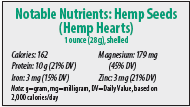Hungry for Hemp Seeds
The Folklore. Hemp is back! This variety of the cannabis plant, not to be confused with its intoxicating cousin (marijuana), is one of the most significant crops in history. Hemp dates back to 8,000 B.C. in present-day Iran and Iraq. It was among the first crops to be cultivated as a textile fiber, in things like cloth, rope, and paper. Every part— seeds, stalks, leaves, flowers, roots—can be used. Historically, it’s been used as food, in religious rituals, and medicinally to treat ailments like wounds, toothaches, and arthritis. Dietary hemp seeds are nutritious, versatile, and tasty.
The Facts. Hemp seeds are from the hemp plant, Cannabis sativa, the same species (but different variety) of Cannabis, or marijuana. Hemp seeds do not contain the psychoactive cannabinoids, tetrahydrocannabinol (THC) and cannabidiol (CBD). Instead, they contain healthy fats, protein, and important minerals. A oneounce serving of hemp seeds packs 10 grams of protein to maintain healthy muscles and keep you feeling full longer, 45% DV (DV=Daily Value, based on 2,000 calories/day) of magnesium to support bone density and circulation, and 15% DV of iron for a strong immune system.
The Findings. An excellent source of omega-3 and omega-6 fatty acids, intake of hemp seeds can support cardiovascular health. According to a study in the journal Nutrients (October 2018), omega-3 fatty acids are essential in the prevention and decreased incidence of cardiovascular diseases, and they may be beneficial in obesity and type 2 diabetes. Hemp seed oil has the highest proportion of polyunsaturated fatty acids, which have been linked to reduced risk of cancer, rheumatoid arthritis, hypertension, and inflammatory and autoimmune diseases (Comprehensive Reviews in Food Science and Food Safety, 2019).
The Finer Points. In the market, hemp seeds, or hemp hearts, are found near other nuts and seeds or in the health food section. Raw and shelled varieties are sensitive to heat and light, so store them
in a cool, dry place or in the refrigerator or freezer. A soft seed, they grind up in smoothies and into nut butter, or they bring a subtle crunch and nuttiness to salads, veggie side dishes, yogurt, cereal, and fruit. Mix them into soups and sauces and baked goods like granola and energy bars for a nutrition and flavor boost. You can also find hemp seed oil, extract, milk, protein powder, and flour.


The post Hungry for Hemp Seeds appeared first on University Health News.

